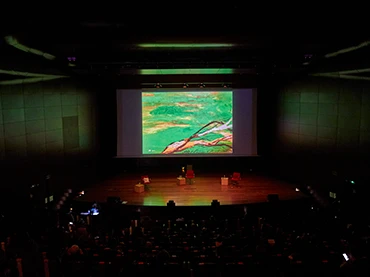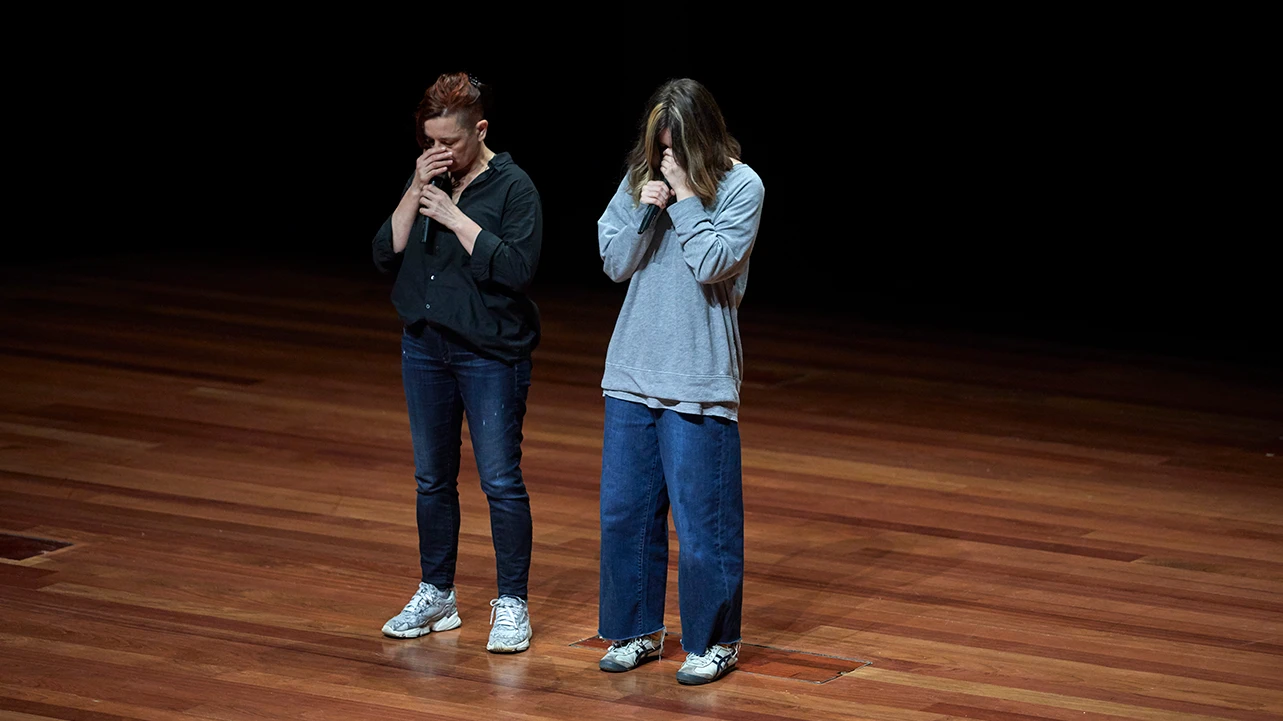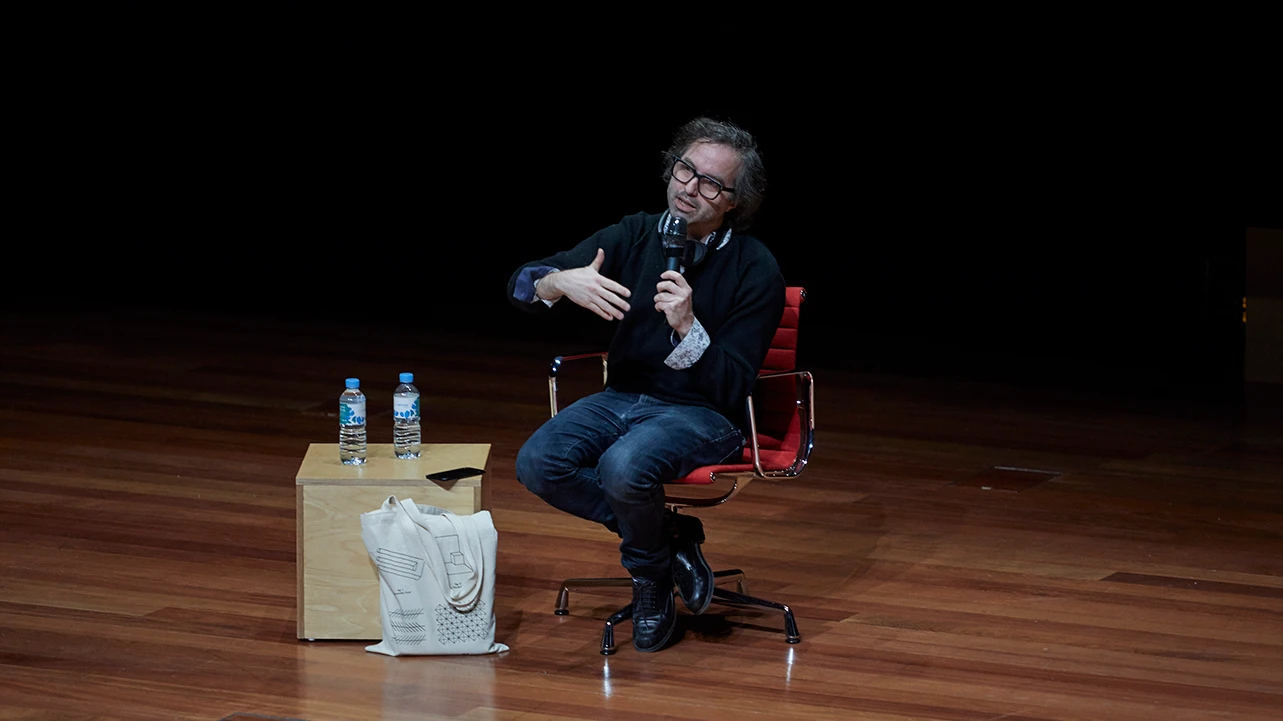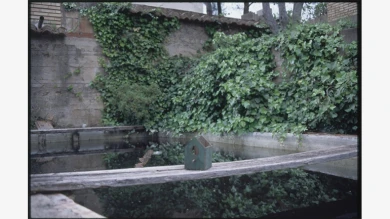
Held on 28 Jan 2021
Night of Ideas is an annual event propelled since 2016 by the Institut français in Paris and occasions a reflection on the major challenges of our times. The sixth edition of the event in 2021 is held under the title Proches (Close) and sets out to rethink the relations between living beings and new forms of solidarity. As a result, the Institut français in Madrid and Museo Reina Sofía have organised a programme which unfurls in different formats and lays out different approaches, from philosophical thought to artistic practice and collective endeavours.
In Emanuele Coccia’s The Life of Plants. A Metaphysics of Mixture (Polity Press, 2018), revisited in his lecture in the Museo Reina Sofía, the philosopher suggests that if it is from plants that we ought to enquire what the world is, this is because it is they who “make the world”. In a presentation around “making place”, Alejandra Riera advocates reconsidering, more mindfully, the relations between human and non-human beings, as sets that are linked, composed, at odds and in dialogue; the result of mixing. “To notice”, writes the artist, “the existence of this place, in this seesaw of exchanges between things-beings-worlds, feels poetically urgent. Incidentally, ‘mixture’, Coccia reminds us, is the common name for what we call, in its proper name, World”. The programme also includes a workshop run by the Torta Collective, a public debate moderated by María González Reyes and a performance by artist Itziar Okariz.
Programme
Retiro Park, Palacio de Cristal, and Sabatini Building, Garden
Activity canceled due to temporary closure of the Retiro Park
4:30pm Entering Through the Window. A New Drift for Travelling Through a Museum, a workshop led by the Torta Collective.
[dropdown]
In the Museo some spaces and doors are open to insects, birds, fungi, yeasts and algae, yet they all pass through cautiously and with trepidation; although they are all invited, we rarely see them. In this workshop, run by the Torta Collective, a walk is put forward through which to build devices to welcome these “beings that protect other beings” who have exited museums swiftly, no longer daring to enter. To enter through the window.
Starting in the Palacio de Cristal, which has opened its windows to allow birds and insects in as part of Petrit Halilaj’s exhibition To a raven and hurricanes that from unknown places bring back smells of humans in love, the expedition includes the making of a house of insects in the Retiro Park and the exploration of the so-called “garden of mixtures” in the Sabatini Building, to finally leave out the back of the Museo, via Calle Hospital. Therefore, the workshop is an incursion with which to create an experience and, like barely visible insects, to leave an almost imperceptible trace.
*Attending the workshop with a flask or small bottle of water is recommended.
[/dropdown]
Nouvel Building, Auditorium 400
6:00pm Making Room. (Inherent) Possible Transformations, presented by Alejandra Riera.
[dropdown]
In the words of Riera: “This proposal involves jointly addressing a reflection around making, inventing places, making place, making room, reconsidering, with greater focus, the relations between human-non-human beings, as sets that are linked, composed, at odds and in dialogue; approaching the question of the ‘here’ in which we find ourselves, as a carrier of narratives and different forms of being. Taking into account life and the uses of places, their forms and potential transformations, and remembering that the point of view is in the body, we will attempt to reflect on what we produce and sketch out differences and places of convergence between landscape, place and environment. Thus, perhaps we can try to imagine how to make place, make place-walkways collectively.
In view of where we find ourselves, where we are going, we always make place and the idea is that ‘encounter has a place’ and that this place is necessary for the encounter to
be as open as possible. Ultimately, there are enough of us interested and ready to re-enliven places in which our lives don’t do anything, when all is said and done, more than pass by, but which we also inhabit in the present. Singularly and collectively, through yet-to-be-found gestures, will we manage to transform issues of so-called ‘ecological transition’ in an issue that has always affected relations, the forms of relation or separation with a still sensitive world around us?
The world of sensibility, that which touches us and through which, like plants — those beings of such eloquent mutism and diversity — we learn that, occasionally, ‘there is no greater proximity than assuming the distance of the other’, as anti-concentration camp psychiatrist Jean Oury said upon describing his mode of relating to people whose form of acting and whose language are hard to comprehend, the mad, but with whom he had decided to closely forge his path.
Emanuele Coccia acknowledges that plants are the only things that, through photosynthesis, do not need to feed off other living beings to survive, while all other organisms live exclusively by incorporating the lives of others. Coccia does not tell us what we must do or no longer do, what we must think of and about beings. More accurately, his ethics seems related to not enclosing, neither closing nor establishing closed categories, nor favouring nor exercising condescendence, which is so widespread, but rather inviting ourselves to doubt any account (both of origin and evolution) that does not recognise the ‘mix’ that exists in us. A mix with no fusion. Not a summation or juxtaposition, not a total integration-fusion, but a mix that already takes place within us. Understanding the existence of this place, this seesaw of exchanges between things-beings-worlds feels poetically urgent. Incidentally, ‘mixture’, Coccia reminds us, is the common name for what we call, in its proper name, World”.
[/dropdown]
7:00pm The Life of Plants. A Metaphysics of Mixture, a lecture by Emanuele Coccia.
[dropdown]
“We barely talk about them and their names escape us. Philosophy has customarily relegated them; even biology considers them as a simple decoration on the tree of life. Yet plants give life to the Earth: they produce the atmosphere that surrounds us; they are the origin of breath that animates us. Plants embody the closest and most elemental link that life can establish with the world. Under the sky and clouds, mixing with water and wind, their existence is a never-ending cosmic contemplation. The Life of Plants is situated from the point of view of plants — leaves, roots, flowers — to understand the world not as a universal space that contains everything, but as the general atmosphere, the climate, a place of true metaphysical mixture,” Emanuele Coccia writes.
[/dropdown]
7:45pm Public debate, moderated by María González Reyes
8:15pm The Ocean Breath, performance by Itziar Okariz, in a collaboration with Izar Ocariz, presented by Isabel de Naverán.
[dropdown]
This work is built from a chorus of breathing. Ujjayi is a breathing technique used in yoga, whereby the artist is the instructor. The word ujjayi means “one who is victorious” and is normally translated as “the ocean breath” because it is the image it evokes. The piece is figurative in nature, between the abstract space of the sound of breathing and the image that generates, as though sign and meaning were separate, fractures.
[/dropdown]
[dropdown]
[/dropdown]
Organised by
Institut français and Museo Reina Sofía
Participants
Emanuele Coccia is a philosopher and associate professor (maître de conférences) at the School for Advanced Studies in Social Sciences, Paris (EHESS). He also holds a PhD in Medieval Philosophy from the University of Florence and has served as adjunct professor in the History of Philosophy at the Alberts Ludwig University of Frieburg, in Freiburg im Breisgau, and Art History at the Duperré School of Applied Arts in Paris. His books, translated into various languages, include Filosofía de la Imaginación. Averroes y el averroísmo (Adriana Hidalgo, 2007), Sensible Life (Fordham University Press, 2016), El bien en las cosas. La publicidad como discurso moral (Shangrila Textos Aparte, 2015), The Life of Plants. A Metaphysics of Mixture (Polity Press, 2018) and Métamorphoses (Payot & Rivage, 2020).
María González Reyes is a professor of Biology in Secondary Education and an activist with Ecologists in Action, where she participates in the sphere of environmental education and eco-feminism. She is the author of numerous books of short stories and co-author of Cambio climático (Litera, 2019), among others. She has written numerous articles related to social environmentalism and contributed to different publications, for instance El Salto, Revista Papeles, Cuadernos de Pedagogía, Graó, La Marea, Revista Ecologista and Pikara Magazine.
Isabel de Naverán conducts research at the crossroads between art, contemporary choreography and performance in projects of curatorship, publishing and writing. She holds a PhD in Art from University of the Basque Country and is part of the research group Artea. In 2010, she founded, with Leire Vergara, Miren Jaio and Beatriz Cavia, Bulegoa z/b - Oficina de arte y conocimiento in Bilbao, a project she was connected to until 2018. Since 2017 she has been in charge of curating live arts (dance-performance) in the Museo Reina Sofía’s Public Activities Department.
Itziar Okariz works in the sphere of action and performance, questioning ways of regulating language and the production of signs that define us. Her most recent projects include her participation in Las estatuas (Museo Jorge Oteiza Foundation, Alzuza, 2020), 13th Shangai Biennale (2020), Perforated by (for the Spanish Pavilion at the 58th Venice Biennale, with Sergio Prego, 2019), I Never Said Umbrella (Tabakalera, San Sebastián, 2018), Una construcción, es decir, una jerarquía de momentos, expresiva de cierto concepto grande o pequeño, abstracto esotérico (CA2M, Móstoles, 2018), Itziar Okariz (Kunsthaus Baselland, Basel, 2017) and Dream Diary (Ars Parcours, Basel, 2017). Izar Ocariz likes to read, write, draw and do karate. Both live in Bilbao.
Alejandra Riera, born in Buenos Aires, has lived and worked in France for thirty years, where she is a professor of Documentary and Transversal Practices and Poetics at the National School of Art Cergy-Paris, and previously taught Film and Documentary Practices at the National School of Art Bourges over an eleven-year period. She upholds a sustained and focused practice on plants and the practice of writing and photography and film (films-documents). Her endeavours and research set forth questions that surface between images and texts as they drive forward the realisation of situated poetics of gestures that join diverse forms of knowledge, knowledge that interrogates the ways we read history and geography.
Her efforts have often fuelled thinking, gestures and collective writings, while her research and plastic and filmic endeavours have been presented on numerous occasions inside and outside of spaces devoted solely to disseminating art and film productions. Since 2017, she has prepared and made a place for, in a collective endeavour, the Garden of Mixtures in the Museo Reina Sofía.
Torta is a collective, made up of Tom Cano and Marta Pérez, which puts forward organic modes of production with the aim of placing value on the links between nature and sustainability, fostering a distancing from neoliberal formulas of competitiveness and efficiency and taking up art and food as research tools. The Collective’s practice is defined as a mode of weaving ties and discourses that help to understand present-day conflicts. During the 2019/2020 academic year, Torta have designed and accompanied the programme of equipo1821 in the Museo Reina Sofía.



Más actividades

Difficulty. Forms and Political Effects of Deviation in Writing and Contemporary Art
23 February – 14 December 2026 – Check programme
Difficulty. Forms and Political Effects of Deviation in Writing and Contemporary Art is a study group aligned towards thinking about how certain contemporary artistic and cultural practices resist the referentiality that dominates the logics of production and the consumption of present-day art. At the centre of this proposal are the concepts of difficulty and deviation, under which it brings together any procedure capable of preventing artistic forms from being absorbed by a meaning that appears previous to and independent from its expression. By ensuring the perceptibility of their languages, difficulty invites us to think of meaning as the effect of a signifying tension; that is, as a productive and creative activity which, from the materiality of art objects, frees aesthetic experience from the representational mandate and those who participate in it from the passiveness associated with tasks of mimesis and decoding.
The economy of the referential norm translates the social logic of capitalism, where insidious forms of capturing subjectivity and meaning operate. In the early 1980s, and adopting a Marxist framework, poet Ron Silliman highlighted how this logic entailed separating language from any mark, gesture, script, form or syntax that might link it to the conditions of its production, rendering it fetichised (as if without a subject) and alienating its users in a use for which they are not responsible. This double dispossession encodes the political strategy of referential objectivity: with no subject and no trace of its own consistency, language is merely an object, that reality in which it disappears.
The political uses of referentiality, more sophisticated today than ever before, sustain the neoliberal-extractivist phase of capitalism that crosses through present-day societies politically, economically and aesthetically. Against them, fugitive artistic practices emerge which, drawing from Black and Queer studies and other subaltern critical positions, reject the objective limits of what exists, invent forms to name what lies outside what has already been named, and return to subjects the capacity to participate in processes of emission and interpretation.
Read from the standpoint of artistic work, the objective capture of referentiality may be called transparency. Viewed from a social contract that reproduces inequality in fixed identity positions, transparent in this objectivity are, precisely, the discourses that maintain the status quo of domination. Opposite the inferno of these discourses, this group aims to collectively explore, through deviant or fugitive works, the paradise of language that Monique Wittig encountered in the estranged practices of literature. For the political potency of difficulty — that is, its contribution to the utopia of a free language among equals — depends on making visible, first, its own deviations; from there, the norm that those deviations transgress; and finally, the narrowness of a norm which in no way exhausts the possibilities ofsaying, signifying, referring and producing a world.
From this denouncement of referential alienation, fetishisation and capture, Difficulty. Forms and Political Effects of Deviation in Writing and Contemporary Art turns its attention to the strategies of resistance deployed by contemporary artists and poets. Its interest is directed towards proposals as evidently difficult or evasive as those of Gertrude Stein, Lyn Hejinian, Theresa Hak Kyung Cha, Kameelah Janan Rasheed, Kathy Acker, María Salgado and Ricardo Carreira, and as seemingly simple as those of Fernanda Laguna, Felix Gonzalez Torres and Cecilia Vicuña, among other examples that can be added according to the desires and dynamics of the group.
The ten study group sessions, held between February and December, combine theoretical seminars, work with artworks from the Museo Reina Sofía’s Collections and exhibitions, reading workshops and public programs. All these formats serve as spaces of encounter to think commonly about certain problems of poetics — that is, certain political questions — of contemporary writing and art.
Difficulty. Forms and Political Effects of Deviation in Writing and Contemporary Art inaugurates the research line Goodbye, Representation, through which the Museo Reina Sofía’s Studies Directorship seeks to explore the emergence of contemporary artistic and cultural practices which move away from representation as a dominant aesthetic-political strategy and redirect their attention toward artistic languages that question the tendency to point, name and fix, advocating instead for fugitive aesthetics. Over its three-year duration, this research line materializes in study groups, seminars, screenings and other forms of public programming.

Institutional Decentralisation
Thursday, 21 May 2026 – 5:30pm
This series is organised by equipoMotor, a group of teenagers, young people and older people who have participated in the Museo Reina Sofía’s previous community education projects, and is structured around four themed blocks that pivot on the monstrous.
This fourth and final session centres on films that take the museum away from its axis and make it gaze from the edges. Pieces that work with that which is normally left out: peripheral territories, unpolished aesthetics, clumsy gestures full of intent. Instead of possessing an institutional lustre, here they are rough, precarious and strange in appearance, legitimate forms of making and showing culture. The idea is to think about what happens when central authority is displaced, when the ugly and the uncomfortable are not hidden, when they are recognised as part of the commons. Film that does not seek to be to one’s liking, but to open space and allow other ways of seeing and inhabiting the museum to enter stage.

Intergenerationality
Thursday, 9 April 2026 – 5:30pm
This series is organised by equipoMotor, a group of teenagers, young people and older people who have participated in the Museo Reina Sofía’s previous community education projects, and is structured around four themed blocks that pivot on the monstrous.
The third session gazes at film as a place from which to dismantle the idea of one sole history and one sole time. From a decolonial and queer perspective, it explores films which break the straight line of past-present-future, which mix memories, slow progress and leave space for rhythms which customarily make no room for official accounts. Here the images open cracks through which bodies, voices and affects appear, disrupting archive and questioning who narrates, and from where and for whom. The proposal is at once simple and ambitious: use film to imagine other modes of remembering, belonging and projecting futures we have not yet been able to live.

Remedios Zafra
Thursday March 19, 2026 - 19:00 h
The José Luis Brea Chair, dedicated to reflecting on the image and the epistemology of visuality in contemporary culture, opens its program with an inaugural lecture by essayist and thinker Remedios Zafra.
“That the contemporary antifeminist upsurge is constructed as an anti-intellectual drive is no coincidence; the two feed into one another. To advance a reactionary discourse that defends inequality, it is necessary to challenge gender studies and gender-equality policies, but also to devalue the very foundations of knowledge in which these have been most intensely developed over recent decades—while also undermining their institutional support: universities, art and research centers, and academic culture.
Feminism has been deeply linked to the affirmation of the most committed humanist thought. Periods of enlightenment and moments of transition toward more just social forms—sustained by education—have been when feminist demands have emerged most strongly. Awareness and achievements in equality increase when education plays a leading social role; thus, devaluing intellectual work also contributes to harming feminism, and vice versa, insofar as the bond between knowledge and feminism is not only conceptual and historical, but also intimate and political.
Today, antifeminism is used globally as the symbolic adhesive of far-right movements, in parallel with the devaluation of forms of knowledge emerging from the university and from science—mistreated by hoaxes and disinformation on social networks and through the spectacularization of life mediated by screens. These are consequences bound up with the primacy of a scopic value that for some time has been denigrating thought and positioning what is most seen as what is most valuable within the normalized mediation of technology. This inertia coexists with techno-libertarian proclamations that reactivate a patriarchy that uses the resentment of many men as a seductive and cohesive force to preserve and inflame privileges in the new world as techno-scenario.
This lecture will address this epochal context, delving into the synchronicity of these upsurges through an additional parallel between forms of patriarchal domination and techno-labor domination. A parallel in which feminism and intellectual work are both being harmed, while also sending signals that in both lie emancipatory responses to today’s reactionary turns and the neutralization of critique. This consonance would also speak to how the perverse patriarchal basis that turns women into sustainers of their own subordination finds its equivalent in the encouraged self-exploitation of cultural workers; in the legitimation of affective capital and symbolic capital as sufficient forms of payment; in the blurring of boundaries between life and work and in domestic isolation; or in the pressure to please and comply as an extended patriarchal form—today linked to the feigned enthusiasm of precarious workers, but also to technological adulation. In response to possible resistance and intellectual action, patriarchy has associated feminists with a future foretold as unhappy for them, equating “thought and consciousness” with unhappiness—where these have in fact been (and continue to be) levers of autonomy and emancipation.”
— Remedios Zafra

27th Contemporary Art Conservation Conference
Wednesday, 4, and Thursday, 5 March 2026
The 27th Contemporary Art Conservation Conference, organised by the Museo Reina Sofía’s Department of Conservation and Restoration, with the sponsorship of the Mapfre Foundation, is held on 4 and 5 March 2026. This international encounter sets out to share and debate experience and research, open new channels of study and reflect on conservation and the professional practice of restorers.
This edition will be held with in-person and online attendance formats, occurring simultaneously, via twenty-minute interventions followed by a five-minute Q&A.

